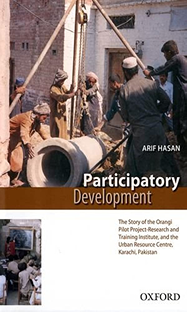Participatory Development the Story of the Orangi Pilot Project Research and Training Institute and the Urban Resource Centre Karachi Pakistan
Material type: TextLanguage: English Publication details: Karachi : Oxford University Press, 2010Description: XVIII, 325 p. : illISBN:
TextLanguage: English Publication details: Karachi : Oxford University Press, 2010Description: XVIII, 325 p. : illISBN: - 9780195476897
- 307.1416549183 HAS
| Item type | Current library | Shelving location | Call number | Status | Date due | Barcode |
|---|---|---|---|---|---|---|
 Lending Collection
Lending Collection
|
Circulation Section | Circulation Section | 307.1416549183 HAS | Available | 86154 | |
 Reference Collection
Reference Collection
|
City Campus Library | City Campus | 307.1416549183 HAS | Available | 98177 |
Summary:
The book is divided into three parts. Part one consists of a description (including statistics) of the poverty, environmental and community related national and the urban contexts within which these projects have been established.
Part two is the story of the OPP-RTI, its origins, its culture and the evolution of its sanitation, housing and education programmes along with a description and evaluation of the processes, communities, NGOS, government agencies and donors involved in them and the principles and advocacy strategies that emerge out of the work of the OPP-RTI. The impact of the OPP-RTI's work, its policy implications and the views of its detractors also form a chapter of this part. Part three describes the work of the URC and the model of research, advocacy and consultation with the actors in the urban drama of Karachi so as to promote a more equitable and just model of urban development which benefits low income communities which form the vast majority of the city population.
